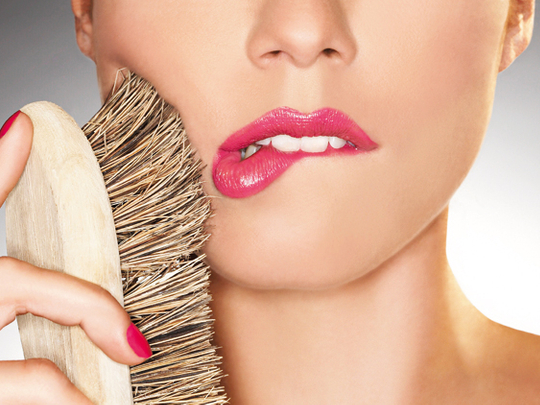
Sin 1: Using harsh exfoliators
Any skincare expert worth their beauty salt will tell you that exfoliating your skin twice a week is a must. Exfoliation plays a huge role in helping rid the skin of dead cells on the surface, keeping bacteria and pimples to a minimum, as well as ensuring that your skin remains bright and even-toned. But according to Natasha Bennett, operations manager at Dermalase Clinic, there are a lot of misconceptions about exfoliators, especially with regard to the type you use.
"Exfoliators come in two forms: scrubs and liquids. Many people are under the impression that a scrub works better purely because you can physically feel an effect taking place," she says. "From a professional point of view, scrubs can actually cause damage to the skin as the particles are often rough and not spherical." Natasha says acne-prone skin should stay away from scrubs altogether as they can spread bacteria and cause further irritation.
Quit it
If you're currently using a scrub exfoliator, you might want to replace it with a liquid one. "Liquid exfoliators usually come in a gel form and the active ingredient is commonly fruit acids or AHA's (alpha hydroxy acids). These gently lift the dead cells without causing abrasions to the skin," says Natasha. You should also exfoliate just twice a week - any more and you'll be in danger of stimulating sebum and dehydrating your skin.
Sin 2: Squeezing pimples
"Pimples are a collection of dead white cells and are therefore full of bacteria and oil," says Natasha. "When you squeeze these pimples, you're exposing the bacteria to the rest of your face. And if you pop more than one, you move germs all over your face."
Still not convinced? Natasha goes on to say that your fingers and nails are one of the most unhygienic parts of your body, carrying millions of bacteria, which multiply every 20 minutes. Just imagine how many germs you could be transferring on to your face.
Squeezing pimples can cause damage, too. "The skin on your face is delicate. Using your nails to remove pimples causes skin trauma," says Natasha. Scratching pimples can leave behind a red or brown mark known as post inflammatory pigmentation, which is difficult to get rid of.
Quit it
Natasha recommends applying a medicated solution, like salicylic acid, on to pimples. As it's anti-bacterial, it will clear up spots without putting your skin through any trauma. If you can't resist a squeeze, Natasha says, "Wash your hands thoroughly with anti-bacterial soap, then wrap tissue around your fingertips and gently wiggle them until the pus is released."
Sin 3: Over-washing your hair
Does it seem like no matter how much you wash and condition your hair, it never looks that healthy? That's probably because you're washing it too much! "Washing your hair too often strips your locks of their natural oils, which results in dry, damaged tresses," says Tony Bou Khalil, senior stylist at Toni & Guy. He says over-washing is particularly bad for drier hair, which should be left as long as possible between washes to allow the natural oils to saturate.
Over time your hair will lose its natural shine and vitality. Though over-washing hair doesn't sound like a terrible sin, it can have drastic consequences. "You may experience more hair loss than usual due to the constant chemicals drying out your scalp, and drier hair will become very brittle, making it more prone to snapping," says Tony.
Quit it
Only wash your hair every day if it is especially oily. Most other hair types can last for a week between washes. If the idea of not washing your hair for a week bothers you, then Tony suggests using the mildest products you can find. He also recommends sprinkling a dry shampoo, or even talcum powder if you have blonde hair, on to your roots, to help soak up any excess oil. Try the Dry Shampoo by Lee Stafford, Dh45.
Sin 4: Not trimming split ends
We're all guilty of putting off a visit to the salon, but did you know that not keeping your split ends in check could spell disaster for your locks? "Split ends are like a disease for your hair," says Tony. "They continue to work their way up the strand of the hair, becoming ever more apparent and noticeable." Tony goes on to say that split ends are an indication of dry, damaged hair, which can be a result of chemically colouring your hair, over-using heated stylers, and harsh brushing techniques. According to Tony, these elements zap the moisture out of the top layer of your hair, known as the cuticle, which then breaks to reveal the inner layers.
As well as looking unsightly, split ends mean that it's impossible for you to pull off certain hairstyles such as a sharp, blunt look or a really sleek blowdry.
Quit it
"If you discover split ends, trim them off immediately," says Tony. "Leaving them to travel up your hair will result in cutting off a huge chunk of hair." With no cure for split ends, Tony says prevention is key. He recommends gently combing, rather than brushing, your locks - and to be extra cautious when combing wet hair. "Letting your hair air-dry will also make a huge difference, as will using a good heat-protecting product, such as Label.M Heat Protection Spray, Dh67, before blowdrying."
Sin 5: Not removing makeup before bed
It's called ‘beauty sleep' for a reason, says Samantha Leigh Taylor, product educator for Phytomer. She explains, "Night is when our skin regenerates and it can achieve maximum benefits from freshly cleansed and moisturised skin." Every day, your skin acquires a build-up of pollution, cigarette smoke and makeup. And by not removing this at the end of the day, your skin just won't be able to function properly. It literally can't breathe!
Natasha says that makeup is full of chemicals and bulking agents, which can soak into skin. Plus, there are free radicals that sit on top of makeup. "Free radicals are like the Pac-Man of the skin world," says Natasha. "They eat their way through the healthy cells and cause skin damage."
Quit it
Natasha recommends a basic regime of cleansing, toning and moisturising skin every night, as well as not scrimping on the quality of products. Even if you've had a late night, you should still remove makeup before bed. Invest in a quality makeup remover, and ensure you scrub off every last bit of mascara before applying any skincare products.
Sin 6: Leaving nail polish on for too long
Your nails need to breathe in order to grow and produce new, healthy cells. Tina Ghafurian, general manager of Tips & Toes, says, "Nail polish effectively acts as a barrier against the natural elements that your nail bed craves." So next time you leave your nail polish on for four weeks straight, think again. "Not giving your nails time to breathe results in unhealthy, dry, brittle nails," says Tina. Your nails may also become dehydrated, which results in uneven and bumpy ridges. Nail polish also stains nails, which leaves them with a yellow tinge, resulting in having to apply a darker shade each time.
Quit it
"Remove nail polish the minute you get a chip instead of filling in the gaps with more polish," says Tina. You need to expose your nails to the elements and give them enough time to breathe. Tina says even just one polish-free day is enough. To get rid of any nasty yellowish colouring, try Tina's quick-fix at-home remedy: rub fresh lemon juice on to your nails to reduce the stains. And if you simply can't live without polish, Tina says, "Make sure your cuticles are as nourished as possible. Tito's Tip Top Oil, Dh30, is a life-saver!"
Sin 7: Not applying a daily SPF
When you're already applying serums, spritzers and moisturisers every day, adding a sunscreen to the mix can be too much like hard work. Add to that the fact that we live in a climate where layering thick creams on to your skin simply isn't ideal, and something's got to give. But scrimping on your sun protection shouldn't be it, says Natasha. "Not wearing a daily SPF is one of the biggest beauty blunders you can make," she says.
"The fact is that when it comes to premature skin ageing, the sun is the single biggest factor." She goes on to explain that the sun increases free radical activity, which causes collagen fibres to break down and the melanin in your skin cells to increase, which is what creates pigmentation in your skin. Do you still think that applying that extra dollop of cream is a waste of time?
Quit it
"The more sun damage you prevent now, the better your skin will be in the future," says Samantha. "Sunscreen is the best way to prevent premature ageing, leathery-looking skin, and in some cases, skin cancer." Samantha recommends wearing an SPF20 every day, even if indoors, and an SPF30 if in direct sunlight. Natasha says that tanning your skin is essentially the same as burning it! If you find applying more than one cream too much, then use an SPF in the morning rather than your daily moisturiser.












